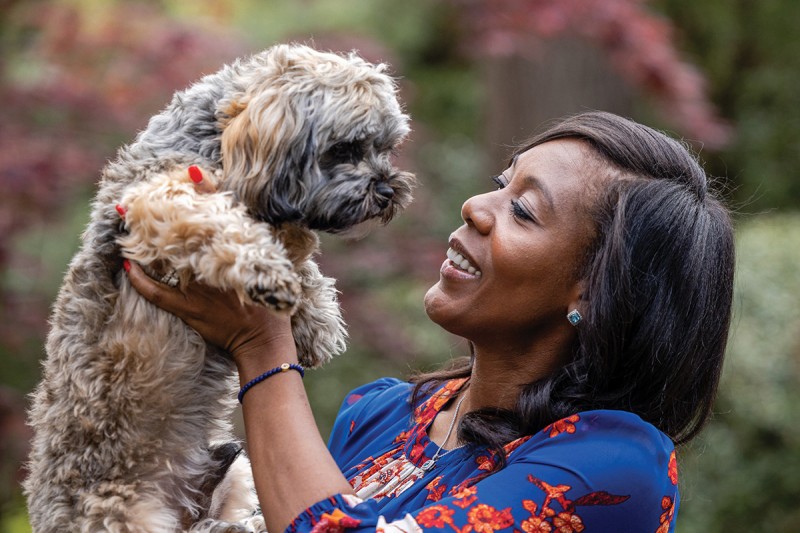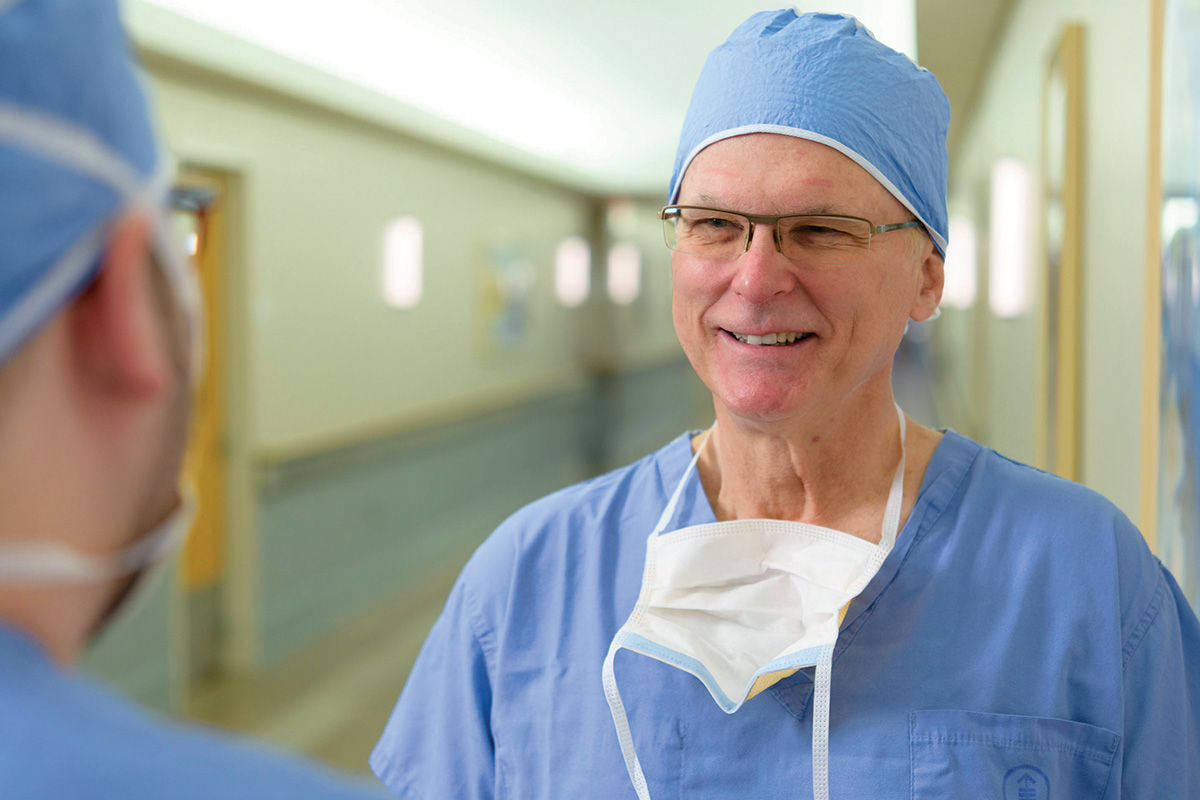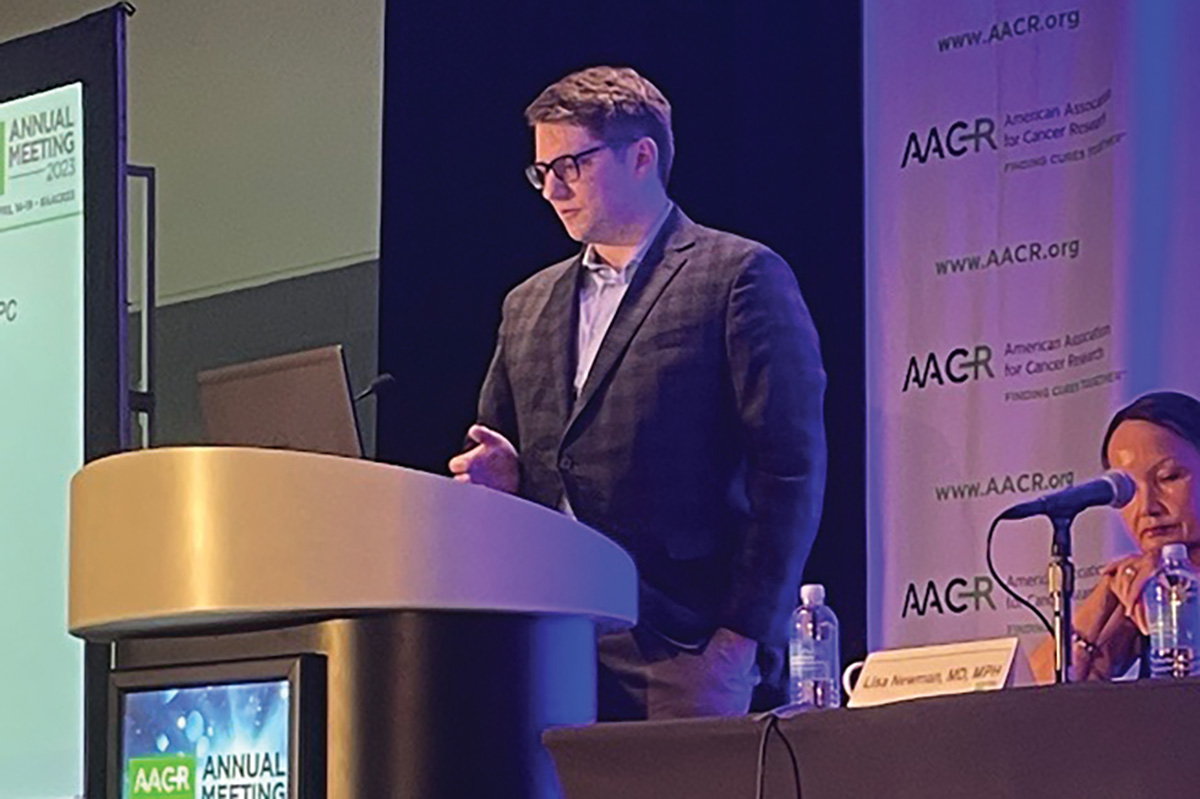
By Jim Stallard
At first, Roxanne Joseph thought she was just hitting the gym weights too hard. The Brooklyn police officer was in top physical condition at age 41 and felt great. But after noticing blood in her stool, she remembered her uncle’s colorectal cancer diagnosis four years earlier. Her doctor referred her to a gastrointestinal specialist, who recommended a colonoscopy. When she awoke from the procedure, he gently confirmed her worst fears: She had the same disease.
“My whole world turned upside down,” she says. “He was telling me I had a large tumor that would have to come out with surgery. I just lay there panicking and wondering, ‘What’s going to happen to me? Am I going to have to retire? My uncle had to wear a bag after his treatment. What is my life going to be like?’”

Roxanne consulted with the police force’s medical division, which recommended that she go to Memorial Sloan Kettering Cancer Center (MSK). In April 2022, she met with MSK surgeon Philip Paty, MD, who explained that the location of the colorectal tumor she had was low, in the rectum. This can be challenging to treat — the pelvis is narrow and contains nerves related to bodily functions — but Roxanne says that Dr. Paty immediately put her at ease.
“He broke everything down for me and made me confident I was going to be OK,” Roxanne recalls. Dr. Paty told her he was optimistic she wouldn’t need an ostomy bag to collect her stool. “It was such a relief. I had tears coming out of my eyes.”
Before the tumor could be removed safely, her doctors needed to shrink it with chemotherapy.
The side effects of this treatment can be rough, and they were hard on Roxanne. She underwent several rounds and suffered severe nausea, dizziness, and nerve pain. At one point, she wanted to quit, but medical oncologist Rona Yaeger, MD, encouraged her, calmly answering every question.
“Dr. Yaeger and Dr. Paty were so compassionate, so warm, so caring,” Roxanne says. “I couldn’t ask for two better doctors to be with me on this journey.”
In September, the tumor had shrunk enough for Dr. Paty to remove it. Nine months later, Roxanne is doing well, with no signs of cancer.
The Molecular Changes That Make a Difference
Roxanne feels fortunate. She is beating the odds. Black patients are 40% more likely to die from colorectal cancer than other ethnic groups. Recent work at MSK has shown that even among patients with colorectal cancer who were treated at the same institution, those of African ancestry don’t live as long after diagnosis as those of European or East or South Asian ancestry.
MSK researchers are discovering that one reason for this disparity in outcomes could be due to the differences in the molecular profiles of tumors between patients of different ancestries. Fewer patients with African ancestry have tumors that are likely to respond to newer treatments (like immunotherapy and targeted therapy).

In fact, patients of African ancestry whose tumors were sequenced at MSK were about 30% less likely to have the genomic changes that would make them good candidates for immunotherapy, according to research presented by computational biologist Henry Walch, MS, at the American Association for Cancer Research Annual Meeting in April 2023. (Genomic changes include mutations in the DNA of a cell. They are important because they can sometimes be targeted with drugs.)
There haven’t been as many targetable mutations identified in Black Americans because most genomic research has failed to include large populations of non-European ancestry. “The hope is that with more diverse populations in our research studies, we will find new targets that might benefit these patients,” Walch says.
There appears to be another important difference in the colorectal tumors in patients of African ancestry — one that could make it harder to predict a prognosis. In most patient groups, a mutation in the APC gene indicates that the patient will have a better outcome compared with someone who does not have an APC mutation. Among patients of African ancestry, however, having an APC mutation in the tumor seemed to make no difference in outcome.
“This finding surprised us. For patients of other ancestries, we observed a very significant difference in overall survival based on the presence of APC mutations, which allows us to classify the prognosis of patients,” Walch says. “However, in patients of African ancestry, APC status was not associated with any differences in overall survival at all.”
“This study is part of a much broader effort to understand why patients of African ancestry with colorectal cancer have poor outcomes,” he says. “Our ultimate goal is to identify ways to intervene and save more lives in this underserved community of patients.”
MSK has been trying to ease the burden of colorectal cancer for Black Americans in many ways — through patient information sessions, community health fairs, and other programs to drive home the message that colorectal cancer screening saves lives. The MSK Ralph Lauren Center offers Harlem and the surrounding community convenient access to screening for colorectal cancers, and MSK physicians have been part of NYC Department of Health outreach efforts that have increased colonoscopies by 64% over the past two decades.
A Return to Normal

Today, Roxanne has almost fully recovered and is ready to enjoy life again with her husband, son, and daughter. She is preparing to return to work soon as a community affairs officer. “I’m Caribbean,” she says. “Getting to work in a Caribbean community, helping people participate in decisions to keep their neighborhoods safe — it’s my biggest joy.” She is especially happy that Dr. Paty’s surgical expertise has enabled her to stay on the job she loves. Thanks to his skill, she did not need an ostomy bag. “I don’t have to retire and go on disability. I get to be my normal self again,” she says. “I’m just really grateful that I had the team that I had. Because if I had gone somewhere else, I don’t think the outcome would have been the same.”